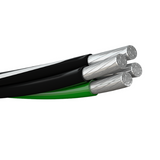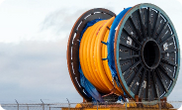What Size Wire For a 70 Amp Breaker?
For a single-phase 120/240V 70 Amp circuit breaker, the best options are 4 AWG copper wire (85 Amps ampacity at 75°C) and 2 AWG aluminum wire (90 Amps ampacity at 75°C). These 70 Amp wire sizes are recommended for a maximum run of 100 feet.

What about 70 amp wire and distances up to 200 feet? You will need 2 AWG copper wire or 1/0 AWG aluminum wire to maintain optimal electrical performance over extended distances. The larger wire gauge reduces resistance and minimizes voltage drop over the longer distance. Bigger size ensures efficient delivery of 70 amp current without significant energy loss.
Can a 6-gauge wire handle 70 amps?
Sometimes, people choose to go for 6-gauge wire, thinking it’s suitable for 70 amps, just because it is a popular wire size. This is a mistake because a 6-gauge wire cannot handle 70 amps. A 6-gauge wire typically has an ampacity of around 55-65 amps. This is not sufficient for a 70 amp load, potentially leading to overheating, circuit damage, and safety hazards.
What is a 70 Amp Breaker Used For?
Breaker 70 Amp is quite versatile and is used across multiple industries. Here are a few potential uses:
- Large Appliances in Residential Applications: In homes, a 70 amp breaker box might be used to power larger appliances like electric ranges, ovens, or central air conditioning units. These devices require more current due to their energy demands.
- Commercial Equipment: Small to medium-sized commercial equipment, such as industrial ovens, machinery, and some commercial air conditioning units, utilize a 70 amp breaker to accommodate their power needs.
- Workshops and Garages: Workshops and garages often house tools, compressors, and welders that can draw higher currents during operation. A 70 amp breaker could handle the load from such equipment.
- Outdoor Installations: For outdoor purposes like lighting, irrigation systems, or outdoor outlets, a 70 amp breaker may be necessary to ensure reliable power supply across larger outdoor spaces.
- Temporary Installations: Construction sites or temporary setups may require higher amperage for tools and equipment. A 70 amp breaker can support these demands.
- Electric Vehicle Charging: Some electric vehicle charging stations could require a 70 amp breaker to provide a faster charging rate for electric cars.
- Subpanels: In scenarios where additional circuits are needed, a 70 amp breaker can serve as the primary connection point for a subpanel. Subpanels are used to distribute power to various areas of a building or property, such as separate sections of a large house or different parts of a commercial space.
- HVAC Units: Heating, ventilation, and air conditioning systems in larger residential or commercial settings can require substantial power. A 70 amp breaker can accommodate the energy demands of HVAC units and ensure efficient heating and cooling operations.
- Hot Tubs and Pools: For outdoor recreational installations like hot tubs and swimming pools, a 70 amp breaker is often used to manage the electrical requirements of heating systems, pumps, and lighting.
Electrical Cables for 70 Amp Breaker
When selecting electrical cables for a 70 amp breaker, distinct cable types offer tailored advantages based on specific needs.
- NM-B (Non-Metallic Sheathed Cable). NM-B cables are suitable for interior wiring, often used for residential applications like powering lighting and outlets. NM-B cables are ideal for indoor scenarios. They are suitable for residential applications.
- SE (Service Entrance) Cable. SE cables are outdoor-rated cables designed for overhead and underground service entrance applications. SE cables are fitting for outdoor installations like powering detached garages or sheds.
- UF-B (Underground Feeder). UF-B cables are engineered for direct burial, making them apt for outdoor and underground applications. Their moisture-resistant insulation ensures reliability in wet conditions. They are suitable for outdoor lighting, irrigation systems, and exterior outlets.
- THHN/THWN (or THWN-2) Wires in Conduit. These wires are often used within conduit systems for their durability and versatility. THHN/THWN wires are flame and moisture-resistant, making them suitable for various indoor and outdoor applications, including workshops, garages, and HVAC units.
- Mobile Home Feeder (MHF) Cable. Specifically designed for mobile homes, MHF cables offer higher ampacity and flexibility for feeding power to these structures. Their insulation withstands varying weather conditions.
Sum Up
Remember, your local regulations and standards also affect the right wire size for your circuit. Consult your area's electrical codes to ensure that your setup aligns with safety and operational standards.
The choice of cable depends on factors such as environment, application, and safety considerations. NM-B and THHN/THWN wires suit residential and workshop settings. SE and UF-B cables excel in outdoor scenarios, while MHF cables cater to mobile home power needs.

























